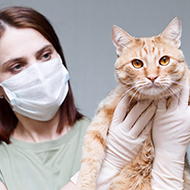"These two cases of human-to-animal transmission...demonstrate why it's important that we improve our understanding of animal SARS-CoV-2 infection." Professor Margaret Hosie.
Animal-to-human transmission still 'low risk' to public health.
A study led by the University of Glasgow has identified two cases of human-to-cat SARS-CoV-2 transmission, found as part of a COVID-19 screening programme of the UK's feline population.
The infected cats were both different breeds and came from two separate households where a human resident had previously displayed COVID-19 symptoms.
According to the researchers, both animals displayed mild to severe respiratory signs. However, one of the cats – a four month-old female ragdoll kitten – sadly had to be euthanised after its condition deteriorated.
Researchers at the MRC-University of Glasgow Centre for Virus Research (CVR) completed full genome sequencing of the SARS-CoV-2 genome in the other cat – a six year-old female Siamese – and found that it was very similar to viral genomes circulating in humans.
Currently there is no evidence of cat-to-human COVID-19 transmission, or that cats, dogs or other domestic animals play a role in the epidemiology of human Covid infections.
However, the researcher team states that these two known cases of human-to-cat transmission in the UK are likely to be an underestimate of the true frequency of human-to-animal transmission, as animal testing is limited.
Professor Margaret Hosie from the MRC-University of Glasgow Centre for Virus Research, lead author of the study, said: “These two cases of human-to-animal transmission, found in the feline population in the UK, demonstrate why it is important that we improve our understanding of animal SARS-CoV-2 infection.”
“Currently, animal-to-human transmission represents a relatively low risk to public health in areas where human-to-human transmission remains high.
“However, as human cases decrease, the prospect of transmission among animals becomes increasingly important as a potential source of SARS-CoV-2 reintroduction to humans. It is therefore important to improve our understanding of whether exposed animals could play any role in transmission.”







 Birmingham Dogs Home has issued an urgent winter appeal as it faces more challenges over the Christmas period.
Birmingham Dogs Home has issued an urgent winter appeal as it faces more challenges over the Christmas period.
